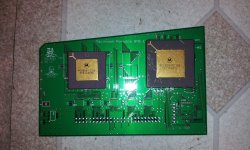techknight
Well-known member
I touched on this subject awhile back, but now I am thinking about it and going forward with it.
The ram card was a successful failure, it worked great and I sold quite a few but interest dropped off quickly, and ebay was not getting any more interest. There are still a few I might assemble, but ultimately with little demand i scrapped the project, and will likely come to a close. My thoughts on that is probably that most portables come with at least a 1 to 3MB Ram card already which is plenty for the machine. But I digress...
So this is my next idea. Thoughts? As far as I am aware, there are no accelerators that exist for this machine. And I want to be able to run a 68020/68030+ just because I can.
This is going to be a large project with many roadblocks I am sure. One being the machine isnt 32-bit clean of course, and I dont know how mode32 is going to act because I am sure the machine is going to return a gestalt that isnt like anything thats ever been seen. lol.
For now, i think it will remain DelcROM-Less and simply take over the 68000 as a bus master. So without ROM, or drivers, itll appear as a 68020, and probably will not see the FPU without some sort of a patch to tell the OS that an FPU is present.
This processor upgrade will probably over-tax the internal 5V regulator, but I have that covered. the full battery voltage I think is present on the PDS, so I will likely use an on-board switching buck regulator to power this card outside of the main system power.

The ram card was a successful failure, it worked great and I sold quite a few but interest dropped off quickly, and ebay was not getting any more interest. There are still a few I might assemble, but ultimately with little demand i scrapped the project, and will likely come to a close. My thoughts on that is probably that most portables come with at least a 1 to 3MB Ram card already which is plenty for the machine. But I digress...
So this is my next idea. Thoughts? As far as I am aware, there are no accelerators that exist for this machine. And I want to be able to run a 68020/68030+ just because I can.
This is going to be a large project with many roadblocks I am sure. One being the machine isnt 32-bit clean of course, and I dont know how mode32 is going to act because I am sure the machine is going to return a gestalt that isnt like anything thats ever been seen. lol.
For now, i think it will remain DelcROM-Less and simply take over the 68000 as a bus master. So without ROM, or drivers, itll appear as a 68020, and probably will not see the FPU without some sort of a patch to tell the OS that an FPU is present.
This processor upgrade will probably over-tax the internal 5V regulator, but I have that covered. the full battery voltage I think is present on the PDS, so I will likely use an on-board switching buck regulator to power this card outside of the main system power.

Last edited by a moderator:
